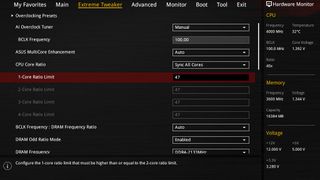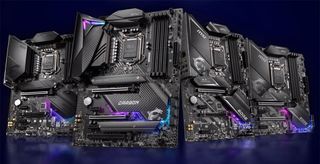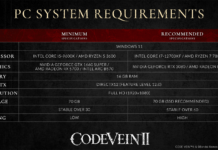PC Gamer is supported by its audience. When you buy through links on our site, we may earn an affiliate commission. Learn more
By published
Custom, open source BIOS software could offer tailored improvements over manufacturer spec ones.
A motherboard’s BIOS is often seen as sacrosanct in how it offers low-level control over a gaming PC. However, turns out that’s actually not true, and your motherboard’s BIOS is just as open to fiddling with as any other PC part. If you’re brave enough.
An open source Linux consulting company called 3mdeb has successfully loaded an open source BIOS, called Coreboot, and a firmware distribution framework of its own creation, called Dasharo, onto a modern Intel Alder Lake Z690 motherboard from MSI.
It’s done so in hope of offering even greater control over the fundamental PC software to the end user with the open source BIOS software.
Coreboot is a like-for-like replacement for your BIOS/UEFI firmware running on your motherboard by default. It’s designed by various engineers, some who reportedly also have worked on the Linux kernel, and is intended to open the door to cross-vendor, cross-platform improvements to the BIOS firmware that’s both faster and more secure than traditional vendor-specific versions. You can read all about Coreboot and recent efforts to bring it to modern chips in this Reddit thread or how Coreboot works with various user interfaces, called payloads, here.
A few key benefits of Coreboot: it is «unbrickable», meaning updating the firmware should no longer put your PC in any danger; it’s secure with a minimal Trusted Computing Base; it’s designed to boot super quickly, in under a second; and you can load up your own boot splash screen jpeg. That last one is of the utmost importance.
One of the largest users of Coreboot today, which you might recognise, is Google for its Chromebook devices.
Linux experts Phoronix note that Coreboot has been in the past limited to much older equipment, however, and unable to keep up with the latest tech. Yet with confirmation of the software working on an Intel Alder Lake motherboard, the MSI Pro Z690-A WiFi DDR4, that’s no longer strictly the case.
The process is still in its early stages, however. The team working on porting the Coreboot software has only recently been successful in booting Ubuntu, though has many issues to figure out before it’s ready to compete with hardware manufacturer alternatives today.
«We just started porting we’re barely booting Ubuntu for now and not all devices work as expected (e.g. no sound), but we will improve in following weeks and months,» Piotr Król, CEO of 3mdeb, says in the Phoronix forums. «We also have limited testing capabilities in comparison to main hardware vendors, so support in testing would be appreciated.»
«We have technical knowledge and access to resources to provide as much OC features as community needs, if for one would be missing those can be added in the future,» Król continues.
So far 3mdeb is focusing its efforts on Intel motherboards, with the hopes of convincing some motherboard manufacturers to actually support their efforts directly in creating open source BIOSes. It does say, however, that it doesn’t appear as though that will happen just yet, as at least MSI considers its BIOS to be an important part of its business.
«Of course for retail mainboard manufacturers which don’t want to cooperate by providing schematics we sometimes forced to implement adversarial interoperability, which may rise the cost, but for friendly manufacturers it may be not that expensive.»
Best AMD motherboard: your new Ryzen’s new home
One such difficult the team is running into is in regards to AMD motherboards. 3mdeb says it is pushing hard to work with AMD, however, it believes the company may not have the resources spare to dedicate to such an endeavour.
«Unfortunately AMD is not easy to play with, we’re trying hard, but let’s be honest for now Intel has better ecosystem for open-source firmware development. This may be because AMD is in rush, and they are terribly understaffed in all areas in comparison to success they achieved,» Król says on the matter.
While it appears we’re some ways off genuinely available and operational open source BIOS software for every gaming motherboard under the sun—that’s a lot of motherboards—this latest development could open many doors for our gaming PCs. Whether it’ll ever be working with Windows, and its many new security measures, however, could be a much bigger job altogether.
Jacob earned his first byline writing for his own tech blog from his hometown in Wales in 2017. From there, he graduated to professionally breaking things as hardware writer at PCGamesN, where he would later win command of the kit cupboard as hardware editor. Nowadays, as senior hardware editor at PC Gamer, he spends his days reporting on the latest developments in the technology and gaming industry. When he’s not writing about GPUs and CPUs, however, you’ll find him trying to get as far away from the modern world as possible by wild camping.
Sign up to get the best content of the week, and great gaming deals, as picked by the editors.
Thank you for signing up to PC Gamer. You will receive a verification email shortly.
There was a problem. Please refresh the page and try again.
PC Gamer is part of Future US Inc, an international media group and leading digital publisher. Visit our corporate site.
© Future US, Inc. Full 7th Floor, 130 West 42nd Street, New York, NY 10036.












